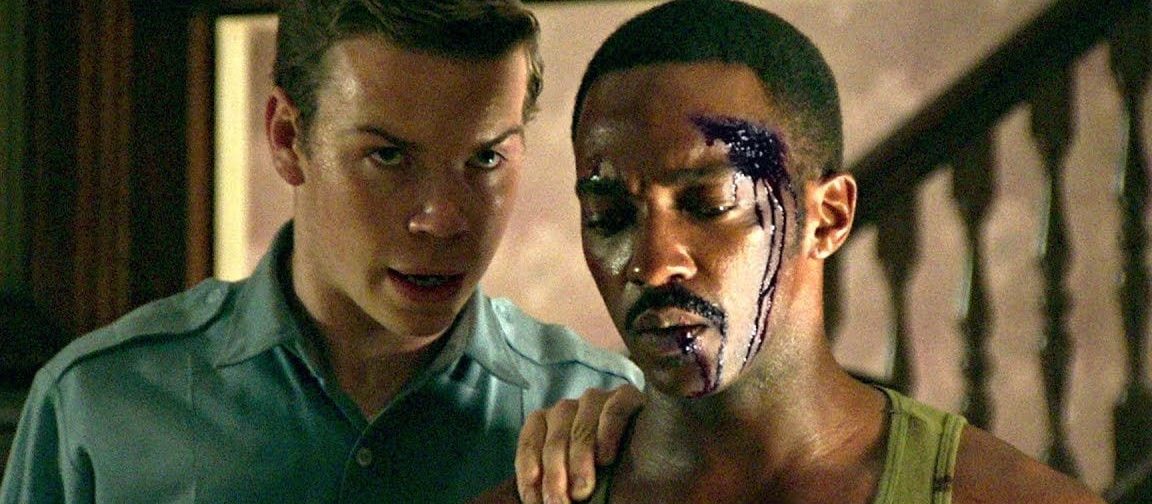
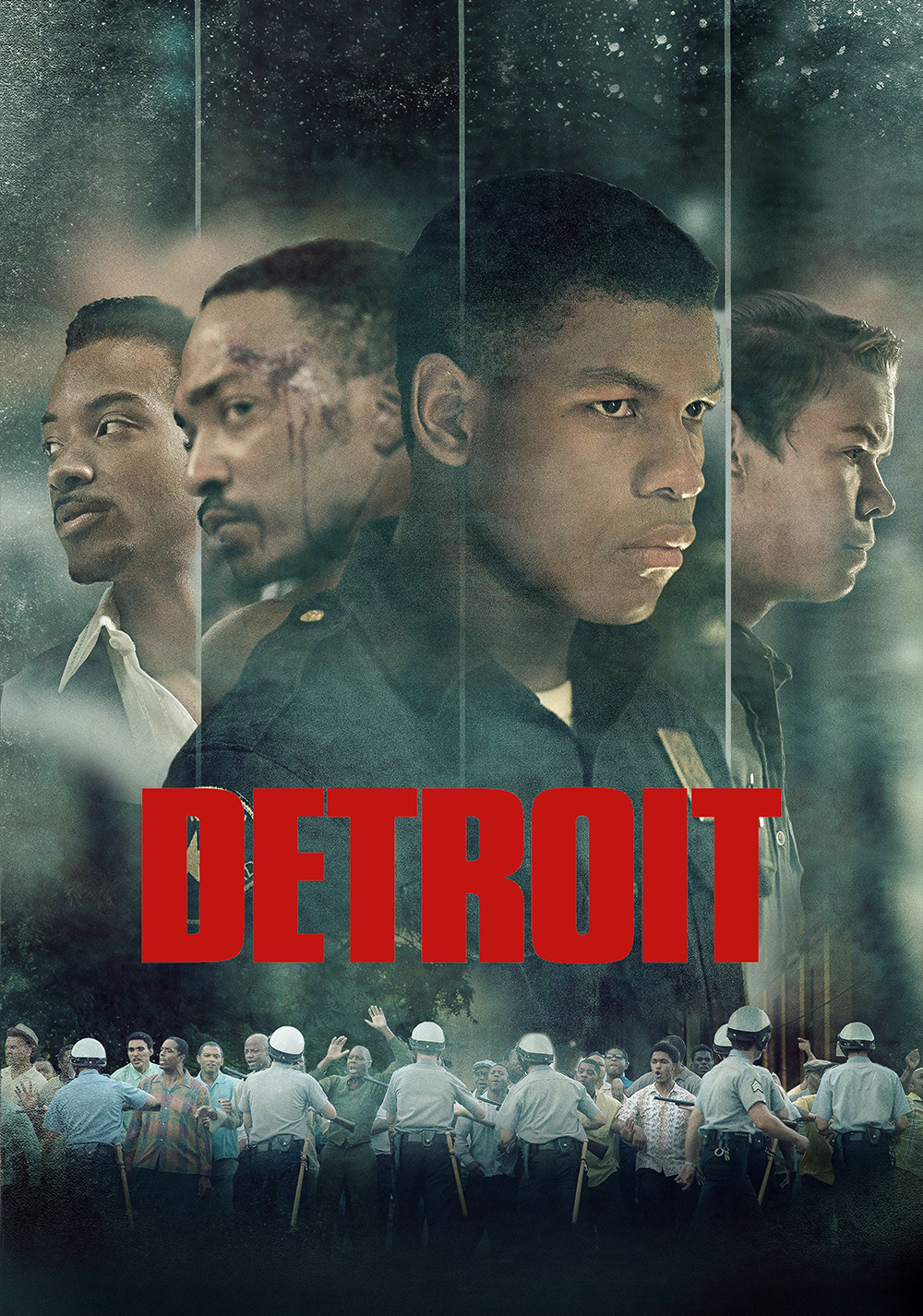
“I’m just gonna assume you’re all criminals.”
Kathryn Bigelow’s Detroit is the kind of movie that you’ll only want to see once. It’s engrossing and upsetting, buzzing with a visceral intensity courtesy of Barry Ackroyd’s jittery, confrontational camerawork that thrusts us into the turmoil of the 1967 Detroit Riot. The centerpiece of the film, which will wrench your gut and have you gripping your seat cushion with anxiety, is a brutal, hour-long sequence at the Algiers Motel, where a blank round fired as a foolhardy prank leads to the murders of three black men at the hands of white police officers. Staged and acted with daring commitment, the harrowing dispute in the motel could stand on its own as a gripping true-life drama along the lines of Paul Greengrass’s United 93 (also lensed by Ackroyd). We don’t need to know the backstories, motives, social climate, etc. because the situation provides enough material in encapsulated form to engage us. When the film strays outside of the Algiers, though, the oddly constructed blend of story strands, archival footage, and courtroom drama fails to contextualize the incident in a meaningful way. Rather than sharpening the focus, the superfluous nature of these extended bookends merely dampens the impact of the riveting high point.
It takes quite a while for us to get to the motel. The unrest begins several days before the event at the Algiers, when the Detroit Police Department raid an “unlicensed club” where a group is celebrating the return of several veterans from Vietnam, among them Karl Greene (Anthony Mackie). As several men are handcuffed and escorted out, a crowd gathers outside and begins throwing rocks and bottles, looting stores, and lighting fires, kicking off the “12th Street Riot.” National Guard and Army paratroopers are sent in to quell the uprising and help the local authorities maintain order. By the second day of rioting, the streets are a warzone—uncontrolled fires, patrolling soldiers, wrecked storefronts. A total breakdown of social order, described by the archival footage of politicians speaking to crowds and B-roll of the rampant destruction. Local politician John Conyers (Laz Alonso) stands on a car in the middle of a crowd of rowdy citizens and implores them to refrain from destroying their own city. “Burn it down!” they yell back at him.
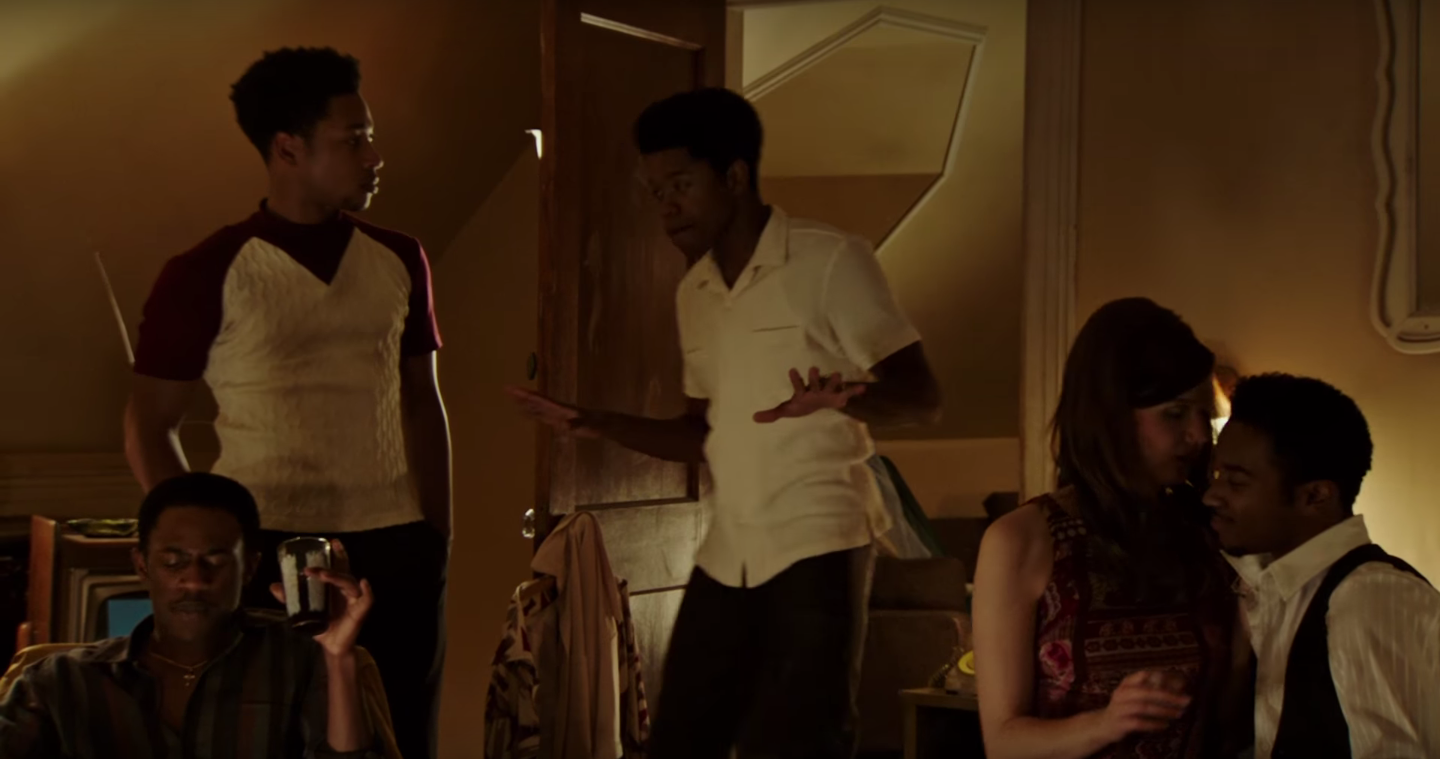
In the midst of this extended chaos, a jumpy group of young policemen patrol the streets. At one point, a young girl peeking through a window blind spooks them so badly that they open fire. Soon after, a young cop named Krauss (Will Poulter) guns down a looter who is fleeing with groceries, his spilled bag of chips highlighting the surreality of the horror. Due to the pressing situation, he is not immediately reprimanded, but remains on duty. “Kid, calm down out there,” his superior tells him—he emphatically does not. Poulter is astounding as a rookie cop, credibly tightroping between irrational action due the overwhelming situation and overt racism.
Meanwhile, the Dramatics, an R&B group, have their show shut down by the authorities just before it begins. On their way out of the city, their tour van is attacked by rioters. To escape the chaos and obey the emergency curfew, the band’s singer, Larry Reed (Algee Smith), and his bodyguard, Fred Temple (Jacob Latimore), rent rooms at the Algiers for the night, finding the motel to be a little oasis where a mostly black crowd is hanging out, relaxing, and having a good time. The singer meets a couple of white girls (Hannah Murray and Kaitlyn Dever) and their friends—Carl Cooper (Jason Mitchell), Aubrey Pollard, Jr. (Nathan Davis Jr), Michael Clark (Malcolm David Kelley) and Lee Forsythe (Peyton Alex Smith). Karl Greene is at the Algiers as well.
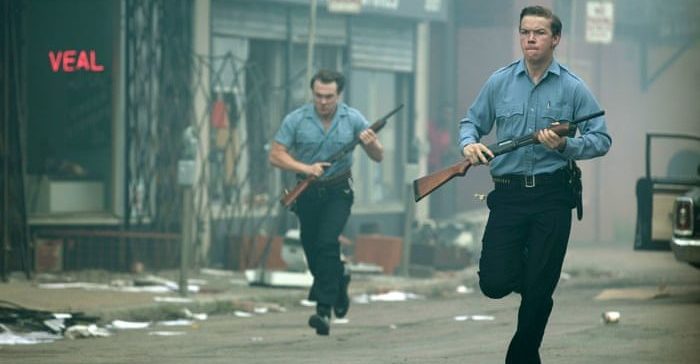
The situation turns on a dime when a prank with a starter pistol goes poorly, and the nearby policeman and National Guardsmen respond to the disruption. Krauss takes the lead, ruthlessly killing Cooper and planting a knife beside his body. After a thorough search of the premises fails to turn up a weapon, Krauss begins terrorizing the patrons—ostensibly trying to discover the gun and the shooter, but also enjoying the power he can exercise over others; and, eventually, getting stuck in a horrible loop of trying to save his own hide when he realizes the gravity of his crimes, leading to further instigation and mayhem. It seems like this interrogation goes on forever. Several officers stick around with Krauss, while many dismiss themselves without acknowledging the misdeeds they witnessed. National Guardsmen turn a blind eye. A bright spot during this stretch is the presence of Melvin Dismukes (John Boyega), a private security guard hired to protect a grocery store from looters. Before the situation escalated, he had made friendly contact with the officers by providing them with coffee. His initial gesture of kindness can be read as organic, or, cynically, as a method of self-protection—he’s aware that the trigger-happy officers, who are white, have displayed a penchant for picking off black men like himself. Before the starter gun incident, Cooper and one of his friends had demonstrated for the two white girls how they envisioned a police encounter would go. When Dismukes follows the officers into the Algiers, he immediately comprehends the dire situation. He’s in a terrible predicament, forced to side with the authoritative officers in word, but in deed attempting to diffuse the tension.
The most unbearable moments of this heinous crime are when Pollard and Temple are killed. Krauss discretely orders that several of the victims (feels incorrect to call them suspects at this point) be moved into separate rooms and face mock executions, hoping that the “deaths” of their friends will convince the survivors to confess. One of the officers, played by Jack Reynor, misunderstands the order and actually kills Pollard. When Krauss suspects that his actions will lead to terrible consequences for himself, he tells the remaining men that they are free to go, on the condition that they won’t speak of what has happened. Temple, who plainly sees a dead body lying on the floor, refuses to deny what he sees with his own eyes, and is shot twice in the chest by Krauss.
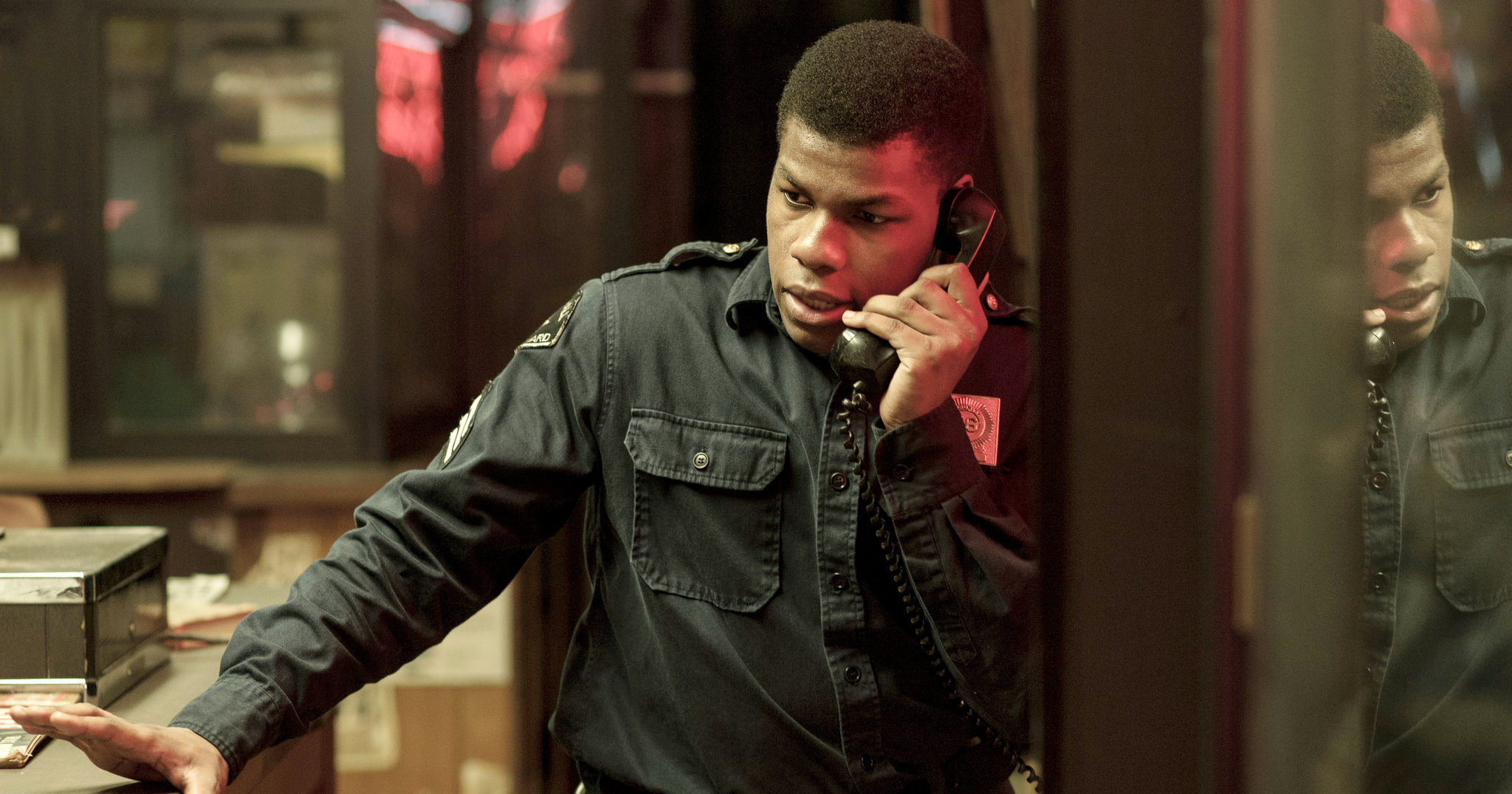
The courtroom drama that wraps things up, conveyed in short snippets, doesn’t do much for me. The officers’ lawyer, distractingly played by John Krasinki, tries to pin the murders on Dismukes, but settles for getting the policemen off on a technicality. The film is awkwardly moving through its paces at this point, but looked at from a meta perspective, it’s possible that this shell-shocked meandering is meant to mirror the impact that this horrible event had on those who survived it; as if their lives have passed them by in a haze as they struggle under the weight of their experience. Other perceived mistakes can be looked at the same way—Bigelow is trying to tell a true story, one that simply does not map nicely onto a typical three-act narrative structure. That being said, the film constructed around the Algiers sequence feels mostly perfunctory and inconsiderately constructed. For instance, instead of an introductory scene that would explain the futility of a black man (or woman) trying to obtain a liquor license in the 1960s—which would have added good context for the initial arrests—we’re presented with a cloying animated sequence of the Great Migration. At times it feels like Bigelow and writer Mark Boal are trying to grasp for a nonexistent thematic silver lining. They are most successful in this attempt in the film’s coda, in which Reed cannot find it in himself to pursue fame and fortune for his artistic endeavors in a world where people can be killed without consequence. This mentality is emphasized when we see him singing in a church choir, a potentially cathartic experience; and yet, Ackroyd’s erratic camera is still bobbing and weaving like a GoPro on a boxer, just as it was in the Algiers, emphasizing that Reed has not yet overcome his trauma.
According to Bigelow, she was compelled to make Detroit after several sensationalist news stories really got to her. It’s interesting that controversial directors used to get investigated for so expertly realizing death on the screen that people thought they were making “snuff” films—actually videotaping the deaths of people and using them in entertainment. But now you can log onto Twitter and watch someone get killed a couple times a week. Bigelow’s film is about as realistic as one could ask for in terms of witnessing the taking of life, perhaps only seen as artificial due to the high quality of the image and the length of the film. Otherwise, the shots look just like the cell phone videos that appear regularly on the news today. Such a realistic portrayal certainly adds a dimension that one cannot get from simply reading about the incident on Wikipedia or in a memoir. Absent creative flourishes and cinematic touches that could have made it more palatable, Detroit is a heavy experience, one that I’m not sure I wish to endure again. There’s clearly meant to be a message here, though it’s frustratingly muddled by the way in which the story is framed as a tragedy. But as an exercise in pure terror, the film proves effective.